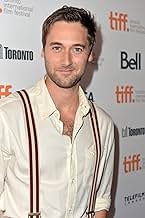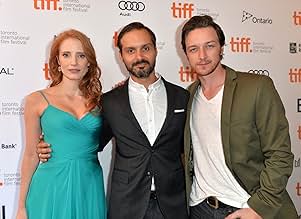CALIFICACIÓN DE IMDb
6.8/10
11 k
TU CALIFICACIÓN
Contada desde la perspectiva masculina, la historia de una pareja que intenta recuperar la vida y el amor que una vez conocieron y recoger los pedazos de un pasado que puede estar demasiado ... Leer todoContada desde la perspectiva masculina, la historia de una pareja que intenta recuperar la vida y el amor que una vez conocieron y recoger los pedazos de un pasado que puede estar demasiado lejos.Contada desde la perspectiva masculina, la historia de una pareja que intenta recuperar la vida y el amor que una vez conocieron y recoger los pedazos de un pasado que puede estar demasiado lejos.
- Dirección
- Guionista
- Elenco
- Premios
- 1 premio ganado y 3 nominaciones en total
- Dirección
- Guionista
- Todo el elenco y el equipo
- Producción, taquilla y más en IMDbPro
Opiniones destacadas
When this intriguing and original film was first screened at the Toronto International Film Festival on September 9, it surprisingly didn't have a release date. Fortunately, The Globe and Mail reports that less than 24 hours after viewing its Toronto screening, distributor Harvey Weinstein scooped it up. And that's a very good thing — no one should have to miss out on this clever and creative story-telling.
Imagine, for a second, that a friend comes to tell you about his terrible break-up. You hear about how hurt he is and how devastatingly it ended, and you feel for him 100 per cent. But then a few days later, you happen to run into his ex and you hear her side of the story. Suddenly, the break-up doesn't seem so clear. Who's "at fault" is murky, and what really brought the relationship to a close is a complex and intricate issue. That's precisely the mystery that Ned Benson brings to us in his new film, The Disappearance of Eleanor Rigby: Him and Her. Rather than simply showing the complex issues of a marriage from one character's point of view, Benson created two separate but united films — one told from the point of view of the husband, and the second from that of the wife. Not only does Benson tackle the issue of perspective — but he also weaves in the subject of memory. What might initially seem like continuity errors between the two halves are quickly revealed to have far more significance and ultimately tell an equally affecting tale. Some differences are subtle, while some are striking — but all showcase how our perspectives subjective, but so too are our memories.
At the beginning of the movie, the lively and upbeat Conor (James McAvoy) and Eleanor (Jessica Chastain) are in a quickly disintegrating marriage. What follows are the stories of how each of them got to where they are, as individuals and as a couple, and where they hope to go. McAvoy and Chastain have proved themselves to be brilliant actors in their own rights — and, if you can believe it, they're even more dynamic and captivating together. Their deep understanding of the story paired with their commitment to the roles and intense chemistry makes this story enthralling to watch from beginning to end.
The one aspect that may have made it harder for this exceptional film to get a wide release is its length. Since it's essentially two separate films, it has a running time of three hours and ten minutes — and not everyone has the patience required. To combat this challenge, The Globe and Mail notes there has been some talk of showing the films each on their own rather than as a combined unit. Although the performances are spectacular, the writing compelling, and the direction well done in each film, it seems to me that a lot of the brilliance of the film's structure would be lost without the two parts together. It's the clever balancing act between the two perspectives and the way they address how much we can trust our memories that make The Disappearance of Eleanor Rigby: Him and Her so unique and captivating. If you were to take away the "Him and Her" in favour of one pronoun or the other, I feel you would lose a great deal of what makes the film special. It might be a longer haul as far as romantic dramas go, but I beg you to grab your popcorn — and a sizeable coffee if necessary — and settle in for the full three hours. This powerful and invigorating tale is worth the time.
Imagine, for a second, that a friend comes to tell you about his terrible break-up. You hear about how hurt he is and how devastatingly it ended, and you feel for him 100 per cent. But then a few days later, you happen to run into his ex and you hear her side of the story. Suddenly, the break-up doesn't seem so clear. Who's "at fault" is murky, and what really brought the relationship to a close is a complex and intricate issue. That's precisely the mystery that Ned Benson brings to us in his new film, The Disappearance of Eleanor Rigby: Him and Her. Rather than simply showing the complex issues of a marriage from one character's point of view, Benson created two separate but united films — one told from the point of view of the husband, and the second from that of the wife. Not only does Benson tackle the issue of perspective — but he also weaves in the subject of memory. What might initially seem like continuity errors between the two halves are quickly revealed to have far more significance and ultimately tell an equally affecting tale. Some differences are subtle, while some are striking — but all showcase how our perspectives subjective, but so too are our memories.
At the beginning of the movie, the lively and upbeat Conor (James McAvoy) and Eleanor (Jessica Chastain) are in a quickly disintegrating marriage. What follows are the stories of how each of them got to where they are, as individuals and as a couple, and where they hope to go. McAvoy and Chastain have proved themselves to be brilliant actors in their own rights — and, if you can believe it, they're even more dynamic and captivating together. Their deep understanding of the story paired with their commitment to the roles and intense chemistry makes this story enthralling to watch from beginning to end.
The one aspect that may have made it harder for this exceptional film to get a wide release is its length. Since it's essentially two separate films, it has a running time of three hours and ten minutes — and not everyone has the patience required. To combat this challenge, The Globe and Mail notes there has been some talk of showing the films each on their own rather than as a combined unit. Although the performances are spectacular, the writing compelling, and the direction well done in each film, it seems to me that a lot of the brilliance of the film's structure would be lost without the two parts together. It's the clever balancing act between the two perspectives and the way they address how much we can trust our memories that make The Disappearance of Eleanor Rigby: Him and Her so unique and captivating. If you were to take away the "Him and Her" in favour of one pronoun or the other, I feel you would lose a great deal of what makes the film special. It might be a longer haul as far as romantic dramas go, but I beg you to grab your popcorn — and a sizeable coffee if necessary — and settle in for the full three hours. This powerful and invigorating tale is worth the time.
The Disppearance Of Eleanor Rigby (nothing to do with the Beatles song except a brief reference by a character) is a thoughtful, exceptionally well made film about a couple dealing with an immense tragedy that has put a weight on their relationship, forcing them to take some time apart. James Macavoy, an actor who continues to impress, and Jessica Chastain, always amazing, play the two with diligent feeling and palpable hurt. Now, there's three different edits of the film. His, which is mostly his side of events following the breakup, where Macavoy takes center stage and we see his life. Hers, which shows us where Chastain ends up, and how she is coping. The third version, Theirs, is a truncated version of both stories, leaving out a lot of key scenes and important beats. His and Hers together come out to about four hours of movie watching, but if you're going to invest yourself in their story, you owe it to you self to watch them both, starting with His. Because there is four hours of their story, they are allowed to develop and interact in a fashion that feels far more genuine and lifelike than a rushed two and a half hour movie. Macavoy is an aspiring cook who runs a small café with his friend and sous chef (Bill Hader, fiercely funny) and yearns for Chastain, angry at life for throwing them the curveball it did. He moves in with his father (Ciaran Hinds gives phenomenal work), a successful restauranteer. Chastain moves in with her folks as well, played by Isabelle Huppert and William Hurt. Hurt, who hasn't been around that much lately, makes up for that by anchoring a key scene with Chastain. It's interesting that he gets to play her father in a film, because they both share a measured, baleful, hypnotic grace in their work, and seeing them interacting was a treat for me, being an immense fan of both their work. Now, the film is more than the sum of its parts, but I mean that in a good way, since the parts themselves are so brilliantly done as well. It's what we expect from the romantic drama Avenue, but because we see an extended fluidity to the work, a narrative free from the fractured conventions of usual editing styles, we feel right there with our two protagonists, every step of the way. More films should break the mold and try to be more than just segmented movies, and use immersion techniques like this to draw us in. Coupled with that unique method of delivery comes a sincere commitment from actors and director alike, to explore an aspect of life and relationships that many see as unpleasant or upsetting, yet can still make for beautiful work. Well worth a watch.
One thing that I do like about this film is that when this movie does show scenes where the characters are in love with each other, it's very well done. At least the performances are. When these two are in a scene together, you can get a good vibe of what they're feeling. It could be them in love, depressed, scared, or anything that involves emotion. This movie does focus on the emotion of James McAvoy.
It's not just the emotion however. You do know very well that McAvoy is still in love, he cares, and the movie does focus on that, but it also focuses on his work job. That may not seem like it is interesting, but it does add a bit more to what McAvoy's character is dealing with, because it's not going completely well with his work space either.
The title of the movie is a good one. It seems like it came from a novel you would find somebody reading at a coffee store, but it is an original title and film. This movie does a decent job on it. Chastain isn't in this movie that much, you are curious where she is when she's not involved in the story. When she does show up, you question what her motivation is to why we're seeing her, and part of the fun is that we have to see the other film to see her motivations and other stuff.
My few complaints about this film is that the concept of this story does seem interesting, however it isn't a very compelling story. Like I said, part of it is because we don't know what Chastain's character is thinking, but nothing really grabs you unless it's a scene with McAvoy and Chastain together.
Which leads me to a specific scene involved with them. Now I'm not going to spoil it because spoilers are no fun. We really don't know what the real reason is why these two split up and when the movie does reveal why, it gives a bigger impact on how the characters reacted when they're together, which to me, makes those scenes a tiny bit more enjoyable.
Also without spoiling anything about the ending, it was very abrupt. I'm pretty sure there is more to it when you see the Her film, but that ending really seemed unnecessary.
The concept of the story is being told is interesting. But when it only focuses on James McAvoy's character, the movie isn't the most entertaining and compelling thing. Yet it when McAvoy and Chastain share the screen, it gets interesting because you can feel their emotions and those scenes with them are well done and compelling, especially one scene that is a big part of the story. The ending may make more sense if both films are scene, but Him is a decent movie that might be even more enjoyable once Her is watched.
It's not just the emotion however. You do know very well that McAvoy is still in love, he cares, and the movie does focus on that, but it also focuses on his work job. That may not seem like it is interesting, but it does add a bit more to what McAvoy's character is dealing with, because it's not going completely well with his work space either.
The title of the movie is a good one. It seems like it came from a novel you would find somebody reading at a coffee store, but it is an original title and film. This movie does a decent job on it. Chastain isn't in this movie that much, you are curious where she is when she's not involved in the story. When she does show up, you question what her motivation is to why we're seeing her, and part of the fun is that we have to see the other film to see her motivations and other stuff.
My few complaints about this film is that the concept of this story does seem interesting, however it isn't a very compelling story. Like I said, part of it is because we don't know what Chastain's character is thinking, but nothing really grabs you unless it's a scene with McAvoy and Chastain together.
Which leads me to a specific scene involved with them. Now I'm not going to spoil it because spoilers are no fun. We really don't know what the real reason is why these two split up and when the movie does reveal why, it gives a bigger impact on how the characters reacted when they're together, which to me, makes those scenes a tiny bit more enjoyable.
Also without spoiling anything about the ending, it was very abrupt. I'm pretty sure there is more to it when you see the Her film, but that ending really seemed unnecessary.
The concept of the story is being told is interesting. But when it only focuses on James McAvoy's character, the movie isn't the most entertaining and compelling thing. Yet it when McAvoy and Chastain share the screen, it gets interesting because you can feel their emotions and those scenes with them are well done and compelling, especially one scene that is a big part of the story. The ending may make more sense if both films are scene, but Him is a decent movie that might be even more enjoyable once Her is watched.
It's very odd how much The Disappearance of Eleanor Rigby: Her gets right that Him just can't measure up to. I'm not sure whether it's because I watched it second, but it's way more clumsily executed. While it does pay off a lot of things set up in Her (and I imagine it'll work vice versa) when it offers an alternate perspective on a scene, that's its only strength. Where Her approached sappiness with its insights on romance, Him too often breaches that mark. It's a more lightweight film, which comes with its own delights with Bill Hadar and that subplot, but moments which elicited tears in Her revisited here had little effect. I'm sure that's not a case of diminishing returns. McAvoy is reliably great, not quite as good as Chastain in Her, but again he bolsters the material. The problem with this portion of the pair is that it paints Eleanor Rigby in a very unappealing light, one I hadn't even considered with Her. Here, I don't see why he's chasing her so much. Nevertheless, Him is still a very good film for when it does hit the spot, just doesn't match its counterpart.
7/10
7/10
The sadness of being an incorrigible completist, I have to finish all these three films before writing my review, Ned Benson's ambitious feature-length debut is a post-trauma story of a young couple Conor (McAvoy) and Eleanor (Chastain) in New York after losing their child in an unspecified accident, HIM centres on Conor and HER centres on Eleanor in the same time period, then interweaves these two versions together, there arrives THEM, one can get an overall view of their paralleled life. So basically, I have watched the same movie twice, and certain scenes three times where the path of Conor and Eleanor converges.
The premise is soundingly intriguing, as often cornily referred as two separate cerebral hemispheres, the film allows viewers to observe how men and women think and act differently towards the same scenario, in this case, a heartbroken tragedy. In HIM, the movie starts with one of their most intimate memory before their bereavement, an inadvertent thrill in their ordinary life sparks strong romance with Conor amorously says: "There is only one heart in this body, please have mercy on me". Then it jumps to several months of the aftermath, Eleanor uses an extreme method to declare that their life can not sustain as the status quo, they need to take a break. Conor doesn't understand why she needs her alone-time for her grievance, he is equally heartbroken, but he is ready to move on, leaving the tragedy behind with a seal on it, not to mention and keeps living on afterwards. He opens a bar with his best friend Stuart (Hader) and a flirty barmaid Alexis (Arianda) who is ready to "falling in love with him madly if he allows her". Meanwhile his father Spencer (Hinds) owns a successful restaurant named after Conor's mother, whom he dumped ages ago, it is also a thorny decision for him whether or not to swallow his pride to admit failure and take the restaurant inasmuch as his bar is on the brink of bankrupt, it is a privileged struggle as a rich kid's blues.
In HER, no romantic prologue, Eleanor is introduced in her abrupt suicidal behaviour, then she returns to her bourgeoisie parents living in the suburb (played by Hurt and Huppert, he is a university professor and she is French), she goes back to the college and takes a class of professor Lillian Friedman (Davis), before long Conor finds out her whereabouts, stalks her in the street, in the classroom and eagerly to reconnect. As Hurt carefully phrases "Tragedy is a foreign country, we don't know how to talk to the natives", Conor's tentative makeup doesn't work, Eleanor needs to be over-indulged in the past for some time before finally moving forward, plus, she can spend all the time she wants in Paris, to heal her wounds, after a whimsical but failed reconnection during a pouring rain and a vis-a-vis opening-up in the middle of the night, it is rather tedious for her to realise that she should take a real break out of the Tri-state area. The disparity erected between each and every individuals cannot be compromised, only when they arrive in the same page with the same pace, they may have a chance to start anew as a couple.
As often as he can, Benson intends to throw snappy verbal rejoinders to sound posh or vivacious, but most of the time they are ill-placed ("Now YOU sound maternal" throwaway) and uninspired, as most of the dialogues verge on beating around the bush either without any substantial function or being painstakingly predictable. Yet the two leads is recommendable in any rate, so it is safe to say the film is perfect for McAvoy and Chastain's stalwarts, both set off a full gamut of emotional overhaul and not to mention many close-ups to let their fans luxuriate in the idolatry. Among the eclectic supporting cast, Huppert radiates in every scene simply by holding a glass of red wine in her hand, and Davis thrusts her raw gravitas into her casual bantering with her THE HELP (2010, 8/10) co- star, as an outsider, she is the one who pierces through the surface without any scruples, only if she could have more screen time in it.
The indie soundtrack is an understandable trapping of the prevalent mumblecore output, it's ambient, moody and meditative, tailor-made to outline the disposition of the storyline. Collectively speaking, the films attempt to be artistic and unique, it could have hit the bull- eye with all such a talented group, only if it could subtract the permeating tint of narcissism, and conjure up some more salient epiphany. At last, the THEM version abridges some minor sequences and merges HIM and HER with an intact take on the proceedings. There is no new scenes added, so one can choose to watch HIM and HER, or THEM, either is sufficiently competent to disclose its allure and drawbacks.
The premise is soundingly intriguing, as often cornily referred as two separate cerebral hemispheres, the film allows viewers to observe how men and women think and act differently towards the same scenario, in this case, a heartbroken tragedy. In HIM, the movie starts with one of their most intimate memory before their bereavement, an inadvertent thrill in their ordinary life sparks strong romance with Conor amorously says: "There is only one heart in this body, please have mercy on me". Then it jumps to several months of the aftermath, Eleanor uses an extreme method to declare that their life can not sustain as the status quo, they need to take a break. Conor doesn't understand why she needs her alone-time for her grievance, he is equally heartbroken, but he is ready to move on, leaving the tragedy behind with a seal on it, not to mention and keeps living on afterwards. He opens a bar with his best friend Stuart (Hader) and a flirty barmaid Alexis (Arianda) who is ready to "falling in love with him madly if he allows her". Meanwhile his father Spencer (Hinds) owns a successful restaurant named after Conor's mother, whom he dumped ages ago, it is also a thorny decision for him whether or not to swallow his pride to admit failure and take the restaurant inasmuch as his bar is on the brink of bankrupt, it is a privileged struggle as a rich kid's blues.
In HER, no romantic prologue, Eleanor is introduced in her abrupt suicidal behaviour, then she returns to her bourgeoisie parents living in the suburb (played by Hurt and Huppert, he is a university professor and she is French), she goes back to the college and takes a class of professor Lillian Friedman (Davis), before long Conor finds out her whereabouts, stalks her in the street, in the classroom and eagerly to reconnect. As Hurt carefully phrases "Tragedy is a foreign country, we don't know how to talk to the natives", Conor's tentative makeup doesn't work, Eleanor needs to be over-indulged in the past for some time before finally moving forward, plus, she can spend all the time she wants in Paris, to heal her wounds, after a whimsical but failed reconnection during a pouring rain and a vis-a-vis opening-up in the middle of the night, it is rather tedious for her to realise that she should take a real break out of the Tri-state area. The disparity erected between each and every individuals cannot be compromised, only when they arrive in the same page with the same pace, they may have a chance to start anew as a couple.
As often as he can, Benson intends to throw snappy verbal rejoinders to sound posh or vivacious, but most of the time they are ill-placed ("Now YOU sound maternal" throwaway) and uninspired, as most of the dialogues verge on beating around the bush either without any substantial function or being painstakingly predictable. Yet the two leads is recommendable in any rate, so it is safe to say the film is perfect for McAvoy and Chastain's stalwarts, both set off a full gamut of emotional overhaul and not to mention many close-ups to let their fans luxuriate in the idolatry. Among the eclectic supporting cast, Huppert radiates in every scene simply by holding a glass of red wine in her hand, and Davis thrusts her raw gravitas into her casual bantering with her THE HELP (2010, 8/10) co- star, as an outsider, she is the one who pierces through the surface without any scruples, only if she could have more screen time in it.
The indie soundtrack is an understandable trapping of the prevalent mumblecore output, it's ambient, moody and meditative, tailor-made to outline the disposition of the storyline. Collectively speaking, the films attempt to be artistic and unique, it could have hit the bull- eye with all such a talented group, only if it could subtract the permeating tint of narcissism, and conjure up some more salient epiphany. At last, the THEM version abridges some minor sequences and merges HIM and HER with an intact take on the proceedings. There is no new scenes added, so one can choose to watch HIM and HER, or THEM, either is sufficiently competent to disclose its allure and drawbacks.
¿Sabías que…?
- TriviaJessica Chastain dropped out of Iron Man 3 (2013) to work on this film.
- Versiones alternativasThis film, along with "The Disappearance of Eleanor Rigby: Her" (2013) and "The Disappearance of Eleanor Rigby--Them" (2014) are variations of the same film. Runtimes are different, as well as editing, which puts the emphasis on the protagonists' different points of view.
- ConexionesEdited into The Disappearance of Eleanor Rigby: Them (2014)
- Bandas sonorasThe Lucky One
Written by Tomas Costanza, Jacquelyn Willard, Ashley Levy, 'Nikki Thompson' and Mike London
Performed by Jacquelyn Willard
Courtesy of Killingsworth Recording Company
Selecciones populares
Inicia sesión para calificar y agrega a la lista de videos para obtener recomendaciones personalizadas
- How long is The Disappearance of Eleanor Rigby: Him?Con tecnología de Alexa
Detalles
- Fecha de lanzamiento
- País de origen
- Sitio oficial
- Idioma
- También se conoce como
- Зникнення Елеанор Рігбі: Він
- Locaciones de filmación
- Productoras
- Ver más créditos de la compañía en IMDbPro
Taquilla
- Total a nivel mundial
- USD 109,144
- Tiempo de ejecución1 hora 29 minutos
- Color
- Mezcla de sonido
- Relación de aspecto
- 2.35 : 1
Contribuir a esta página
Sugiere una edición o agrega el contenido que falta

Principales brechas de datos
By what name was The Disappearance of Eleanor Rigby: Him (2013) officially released in India in English?
Responda







































